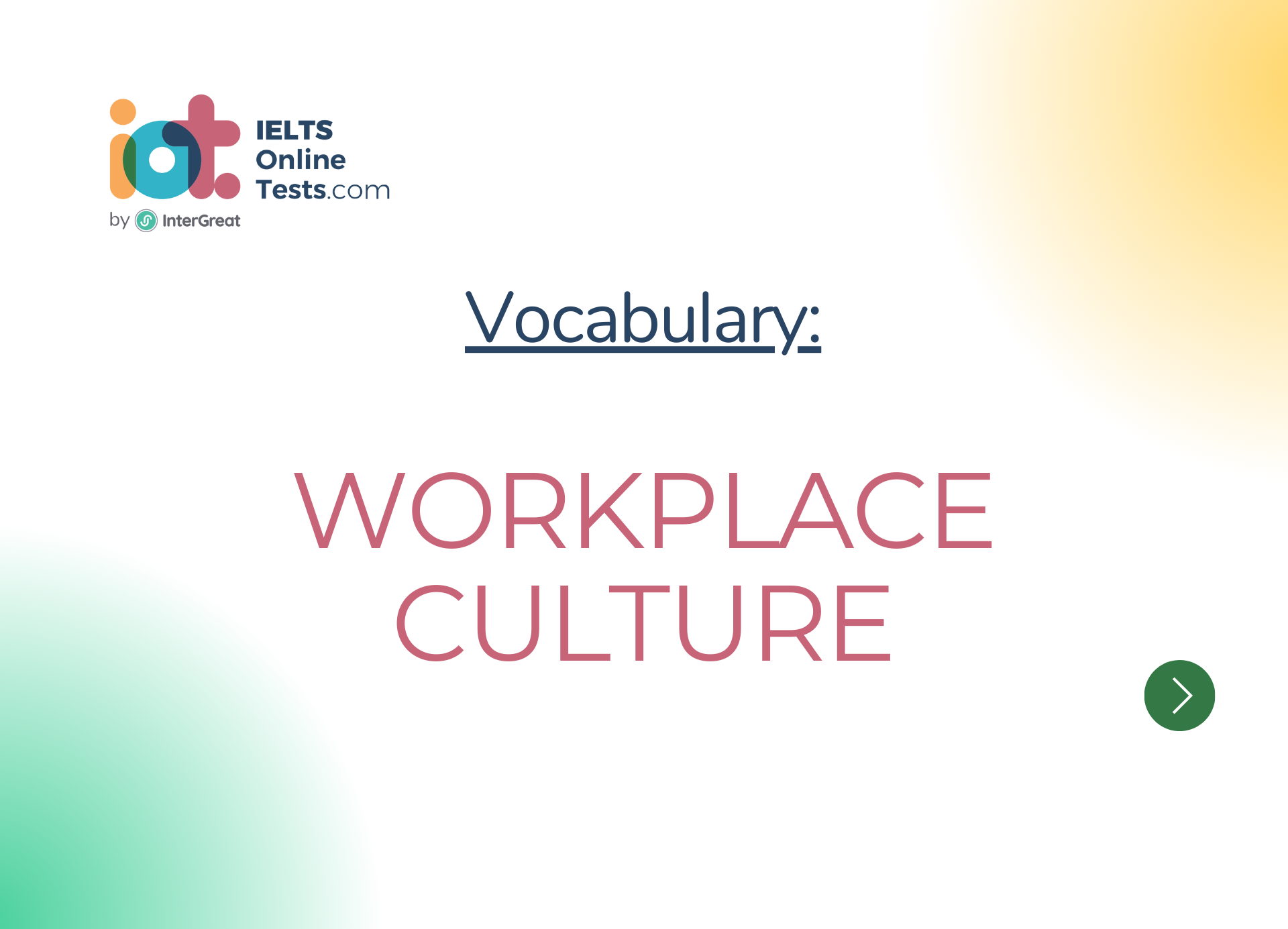
Workplace culture
Below is a detailed list of vocabulary related to workplace culture for the IELTS band score 4.5-6.0:
Workplace Culture:
The values, beliefs, behaviors, and norms that shape the working environment within an organization.
Diversity and Inclusion:
Promoting a workplace that respects and values individuals from diverse backgrounds and ensures equal opportunities for all.
Workplace Etiquette:
The expected code of conduct and manners in a professional setting.
Teamwork:
Collaborating and working effectively with colleagues to achieve common goals.
Leadership:
The ability to guide and inspire a team towards success.
Communication Skills:
The ability to convey information clearly and effectively to others.
Conflict Resolution:
The process of addressing and resolving disagreements or issues between individuals or groups in the workplace.
Professional Development:
Activities and opportunities to improve skills, knowledge, and expertise related to one's job.
Work-Life Balance:
Maintaining a healthy equilibrium between work commitments and personal life.
Adaptability:
The capability to adjust to new conditions, changes, or challenges in the workplace.
Company Values:
The guiding principles and beliefs that an organization upholds.
Ethical Behavior:
Conducting oneself in a morally responsible and honest manner.
Employee Engagement:
The level of commitment and involvement employees have towards their work and the organization.
Workplace Policies:
Official rules and guidelines established by an organization for its employees.
Employee Benefits:
Additional perks and advantages offered to employees beyond their regular salary.
Performance Evaluation:
Assessing and providing feedback on an employee's job performance.
Workplace Health and Safety:
Measures taken to ensure the well-being and safety of employees in the workplace.
Workplace Flexibility:
The degree to which a job allows for adaptability in work hours and location.
Company Mission:
The primary purpose and goals of an organization.
Workplace Morale:
The overall satisfaction and motivation of employees in a workplace.
Positive Reinforcement:
Providing praise or rewards to encourage desired behaviors and outcomes.
Company Culture:
The collective attitudes, values, and behaviors within an organization.
Professionalism:
Demonstrating appropriate behavior and attitudes in a professional setting.
Workplace Productivity:
The efficiency and output of employees in their job roles.
Open Communication:
Encouraging transparency and honest communication within an organization.
Workplace Training:
Programs to enhance employees' skills and knowledge.
Performance Recognition:
Acknowledging and rewarding employees for their achievements and contributions.
Workplace Innovation:
Encouraging and implementing new ideas and approaches to improve processes.
Corporate Social Responsibility (CSR):
A company's commitment to social and environmental concerns.
Workplace Ethics:
The moral principles that guide behavior in a professional environment.
Workplace Collaboration:
Working together harmoniously with colleagues to accomplish tasks.
Workplace Atmosphere:
The overall mood and vibe in the workplace.
Employee Satisfaction Survey:
A survey to gauge the contentment and feedback of employees.
Professional Growth:
Advancement and development in one's career.
Respectful Communication:
Interacting with colleagues in a courteous and respectful manner.
Workplace Challenges:
Obstacles and difficulties faced in a work environment.
Employee Retention:
The ability to keep employees engaged and committed to the organization.
Corporate Values:
The core principles and beliefs upheld by a company.
Workplace Harmony:
A positive and cooperative environment among coworkers.
Employee Empowerment:
Encouraging employees to take ownership and responsibility for their work.
It's essential to understand and use these vocabulary words in context to improve your language skills and perform well in the IELTS exam. Practice incorporating them into your speaking and writing exercises to enhance your fluency and accuracy. Best of luck with your studies and future IELTS endeavors!




